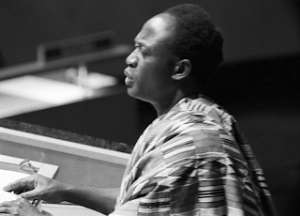
Today Kwame Nkrumah's name occupies a firm place among the names of the most outstanding African politicians and thinkers of the 20th century.
The son of goldsmiths from the Nzema tribe in the former British colony of the Gold Coast, Nkrumah dreamed of becoming an educated person from childhood. He deeply believed in God, and the church helped him to get a primary education.
In America, Nkrumah spent 10 years earning a living and studying. He was a laborer, a dishwasher, a waiter, a teacher in the port. The church again helped him by allocating a scholarship when he studied at two American universities: Lincoln himself, where he studied economics, sociology and theology, and in Pennsylvania, where his subjects were theology and philosophy.
Nkrumah could become a professional priest, but he, like a few educated Africans at the time, was primarily attracted to politics. While still a student, he established the Association of African American Students and Canada. In 1945, Nkrumah went to England and entered first to the University of London, and then to the London Higher School of Economics and Political Science.
Together with the world-famous scientist, political and public figure William Dubois and the future first president of the African state of Kenya, Jomo Kenyatta, he organizes the famous Fifth Pan-African Congress in Manchester, where for the first time the demand for independence of African colonies was voiced.
Returning home, Nkrumah plunges headlong into political life and in 1947 becomes general secretary of the influential anti-colonial organization of the United Convention of the Gold Coast. In 1949, he created his own organization, the People's Party of the Con-Venta, who led the struggle of the population of this colony for political independence.
The name of Nkrumah is associated with the introduction of the African political life of the idea of non-violence, which Nkrumah borrowed from his idol, Mahatma Gandhi. His policy of non-violence, Nkrumah, was called "positive action", in other words, the actions giving the result. "Under positive actions," he wrote, "I understand ... the use of constitutional and legitimate means to undermine the imperialist forces in our country.
A tool for this can serve as a strike, boycott, and refusal to cooperate with the authorities on the basis of the principle of nonviolent action.”
The British colonial authorities acted against Nkrumah and his party with other, very harsh methods. Nkrumah and his comrades were repeatedly arrested, and in 1952, when the first elections to the Legislative Council took place in which the Africans unanimously named him among the first to be condemned, he was in prison.
The influence of Nkrumah in the country was such that when in the same year the Gold Coast achieved the right to have its own African government, received limited independence. The colonial authorities released him from prison and appointed the head of this government.
When in 1957 the colony achieved complete political emancipation and became an independent of Ghana, Nkrumah became its first prime minister. In his political views, there are certain changes: continuing sincerely believing in God. He comes to the conviction that the future of Ghana is a socialism that must be built using the Soviet experience.
The program of socialist transformations didn't bring success, but rather serious social and economic difficulties arose in the country. However, the policy of Nkrumah was not only miscalculations but also successes. They could have been much larger if the regime of his personal power had not been strengthened in Ghana. In 1964, Nkrumah was proclaimed the life president of Ghana, on the streets, in official institutions, schools and universities appeared his statues, busts, portraits.
Nkrumah didn't have only loyal followers but also powerful enemies. In 1966, when Nkrumah was on an official visit to China, there was a military coup in Ghana, and his government was deposed.
ModernGhana reference:
The Confused Moments Of Nkrumah In China After The Coup

Nkrumah spent the last years of his life in exile, in Guinea. He worked hard, wrote several books in which he tried to generalize the anti-colonial struggle in Africa and the results of the independent development of his country.
He left a large scientific and journalistic heritage: more than ten books on history, philosophy, and sociology, and dozens of articles on various topics. He had several academic degrees and honorary titles, books and dissertations written about his life and work. The impact of Nkrumah in Africa's political history was beyond Africa.




 Minority will expose the beneficial owners of SML, recover funds paid to company...
Minority will expose the beneficial owners of SML, recover funds paid to company...
 Prof. Opoku-Agyemang has ‘decapitated’ the NPP’s strategies; don’t take them ser...
Prof. Opoku-Agyemang has ‘decapitated’ the NPP’s strategies; don’t take them ser...
 Abubakar Tahiru: Ghanaian environmental activist sets world record by hugging 1,...
Abubakar Tahiru: Ghanaian environmental activist sets world record by hugging 1,...
 Prof. Naana Opoku-Agyemang will serve you with dignity, courage, and integrity a...
Prof. Naana Opoku-Agyemang will serve you with dignity, courage, and integrity a...
 Rectify salary anomalies to reduce tension and possible strike action in public ...
Rectify salary anomalies to reduce tension and possible strike action in public ...
 Stop all projects and fix ‘dumsor’ — Professor Charles Marfo to Akufo-Addo
Stop all projects and fix ‘dumsor’ — Professor Charles Marfo to Akufo-Addo
 Blue and white painted schools will attract dirt shortly – Kofi Asare
Blue and white painted schools will attract dirt shortly – Kofi Asare
 I endorse cost-sharing for free SHS, we should prioritise to know who can pay - ...
I endorse cost-sharing for free SHS, we should prioritise to know who can pay - ...
 See the four arsonists who petrol-bombed Labone-based CMG
See the four arsonists who petrol-bombed Labone-based CMG
 Mahama coming back because Akufo-Addo has failed, he hasn't performed more than ...
Mahama coming back because Akufo-Addo has failed, he hasn't performed more than ...
